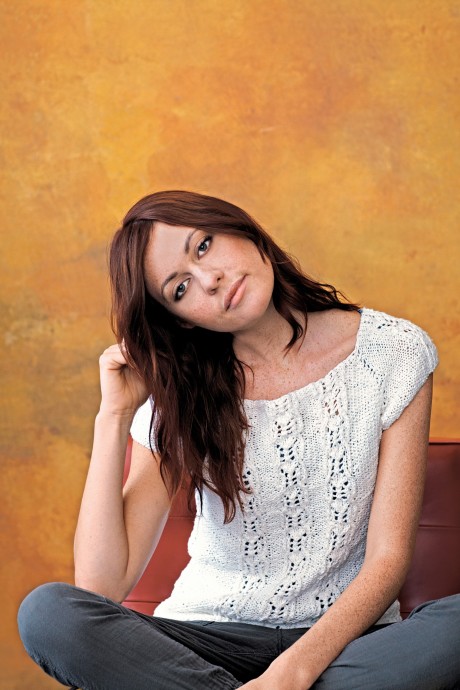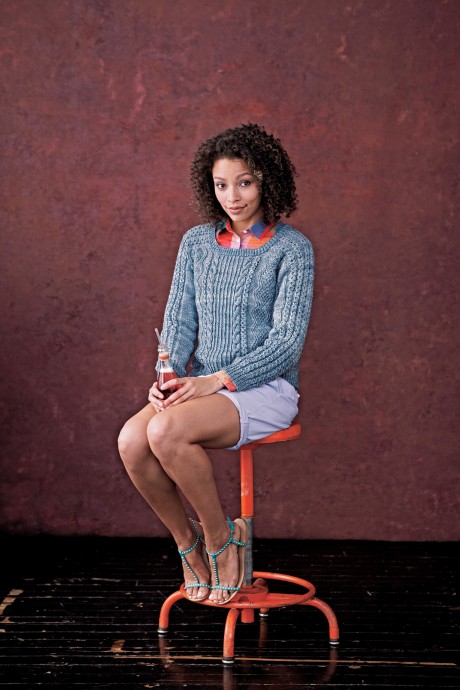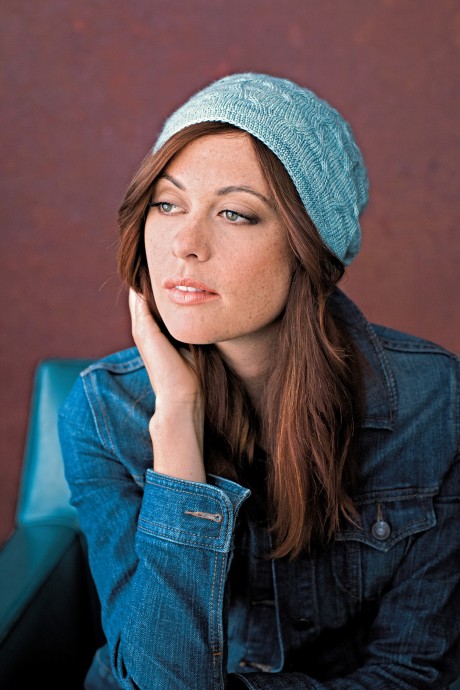After writing Modern Top Down Knitting in 2010, Kristina McGowan has spent the last three years researching, designing and writing its follow-up: aptly titled More Modern Top Down Knitting. We caught up with her to find out more about the process.
What makes More Modern Top Down Knitting different from the first book?
For the new book, I was a bit more disciplined with my approach and systematically went through Barbara Walker’s book (Knitting from the Top) and made garments using all of her templates, designing two items from each. In the first book, there were some templates I didn’t include (such as the ones for trousers and capes). It was fun having the challenge of using all of the templates this time around.

Why is top-down knitting so revolutionary?
I think that some people might find the idea of top-down knitting revolutionary only because it allows knitters to truly embrace properties that are unique to knitting, and to create continuous pieces of work, entirely bypassing the laborious (traditional) task of creating a bunch of separate pieces and sewing them together. The methods involved don’t treat knitting like sewing, which is unique.
The predominant use of circular needles means fewer (if not zero) seams with which to contend, and one can easily try items on at any point in the process (simply by loading live stitches onto waste yarn) and adjust the fit accordingly and with ease. The ability to fine-tune fit along the way is a wonderful advantage of top-down knitting. As knitters, we all know how time-consuming and expensive knitting a handmade item can be. Top-down knitting helps ensure that whatever you’re making will actually fit and that all of your invested labour and time will pay off in the end.

What was it about Barbara Walker’s designs that so inspired you?
It was her techniques that inspired me. I think that there are some people who look at Knitting from the Top and erroneously believe that it is a pattern book and are put off by what may seem like dated illustrations (for culottes, for example, and other styles that were included in the book when it was first published in 1972) and the overall lack of photos.
But the magic of the book is that what Walker presents are techniques and methods that are as applicable and relevant today as they were when she first presented them. Indeed, there is no silhouette one can imagine that her book can’t help see realised. There may be slight stylistic alterations to consider – for example, modern day trousers may not sit as high on the waist today as they did back in the 70s – but the math and methods transcend, and it’s very easy to adjust the templates accordingly. In the case of the trousers, for example, a modern knitter can simply begin a bit further down on the body.
Where do you find inspiration for the details of your designs?
I’m very inspired by vintage dresses and the care often taken to finish inside seams (I adore French seaming) and the lovely inclusion of trim. Giving a lot of weight and attention to seemingly small details (such as finding the perfect buttons) makes all the difference.

What are some of your best knitting memories?
It’s true joy for me to spend time making something and to have what I’ve made worn and appreciated by someone I love. My dearest knitting memories reside in the moments that I’ve given things to people I love and in the looks on their faces.
Do you have a favourite yarn to work with?
I’m a sucker for a beautiful merino wool with a tight twist.
What advice might you give someone who was unsure about trying out a top-down garment?
Any aspect of top-down knitting that may initially seem challenging or even off-putting really isn’t once you give it a try. I understand and appreciate the tendency to stick with what we know and to not readily veer off into uncharted territory. Knitting is supposed to be pleasurable, and certainly not confusing or stressful. But purely from the standpoint of broadening knitting horizons and simply understanding how a different method works (and being able to judge for yourself whether or not there are aspects you can incorporate into your current methods to make them easier) it’s absolutely worth a try. Why not make things easier and cleaner if you can?
All photos by Anna Williams.
More Modern Top Down Knitting is an STC Craft/A Melanie Falick book, and costs £12.11 from The Book Depository.






_333_180_c1.png)
_333_180_c1.png)

_333_180_c1.png)
 Baby
Baby
 Toys
Toys
 Garments
Garments
 Crochet
Crochet
 Homewares
Homewares
 Dolls
Dolls



Share